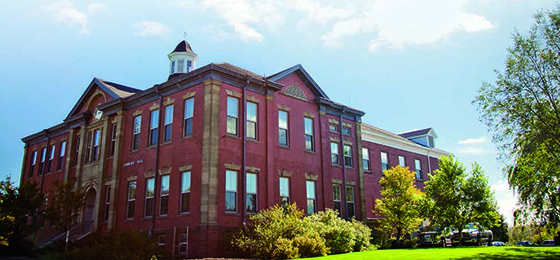
All in the family
By Mark Campbell
Agriculture’s Class of ’56 keeps growing through a unique graduate scholarship.
To Nelson Ball (Diploma (Agriculture)’56), the Class of ‘56 of the former Nova Scotia Agricultural College are are a lot like family. “We don’t always agree with each other,” he laughs. “But we do have a deep and lasting connection that I don’t think you find with any other class.”
That sense of family has manifested itself in many ways over the years. For example, Ball and his fellow alumni have not only made their spouses honourary Class of ’56 members, they’ve made a point of holding annual reunions. The alumni have also taken a strong interest in Atlantic Canada’s future, specifically the survival of our agricultural communities and their access to clean water. And they feel an obligation to support not just the former college – now the Faculty of Agriculture – but also the next generation of students to pass through its halls.
For these reasons, Ball and his classmates, banded together to create the Class of ’56 Graduate Scholarship in 2011. By providing $5,000 in annual funding to graduate students, they’re hoping to stimulate more research on rural water supply and watershed management in the areas of agricultural economics and policy, social sciences, engineering and environmental sciences.
According to alumnus Doug Byers (Diploma (Agriculture)’56), the idea for the scholarship grew in part out of a desire among his classmates to support the Faculty of Agriculture in a meaningful financial way. “It was around 2004, so it was coming up on our 50-year anniversary. There was a basic understanding among us that we’ve been pretty successful, and the Faculty played a key role in that, so we should try to give something back.
A united effort
A Class Alumni Fund was created, but there was no vision on what to do with it until the class helped sponsor a two-day symposium on watershed management and pollution in 2006. “It was clear to us that people in rural Atlantic Canada need some form of help to deal with these issues as they come up,” says Byers. “We thought: ‘Why don’t we do something to support graduate students who are working in this area?’”
Convinced they were on the right track based on the symposium’s success, the class unanimously agreed to create the scholarship, with virtually all alumni contributing to the fund on a regular basis. They formed a scholarship committee made up of class members, as well as Dr. Richard Huggard (Diploma (Animal Science)’56) and Dave Ward (Diploma (Engineering)’56), who play an important internal role. They also agreed that alumni should be involved in the selection process.
“That was important to us,” says Byers. “We felt we could offer something from the diverse experience of our members, and we’ve had really good cooperation from the Faculty.”
Adds Ball: “Essentially, we’re offering financial assistance to graduate students to encourage more interest in this area of study. If even one recipient goes on to become a full professor at the Faculty with a focus on watersheds that would be an amazing thing.”
To date, three scholarships have been awarded for watershed research projects. Recipients are not only invited to present their research results at class reunions, they also become honourary Class of ’56 members, which means the family continues to grow.
“We have a vested interest in the outcome of the research our scholarship recipients undertake,” says class president Ted MacNintch (Diploma (Agricultural Chemistry)’56). “We are also genuinely interested in the academic success of our protégés. We need to be there for this alma mater that has given us so much in the past and which means so much to us.”
